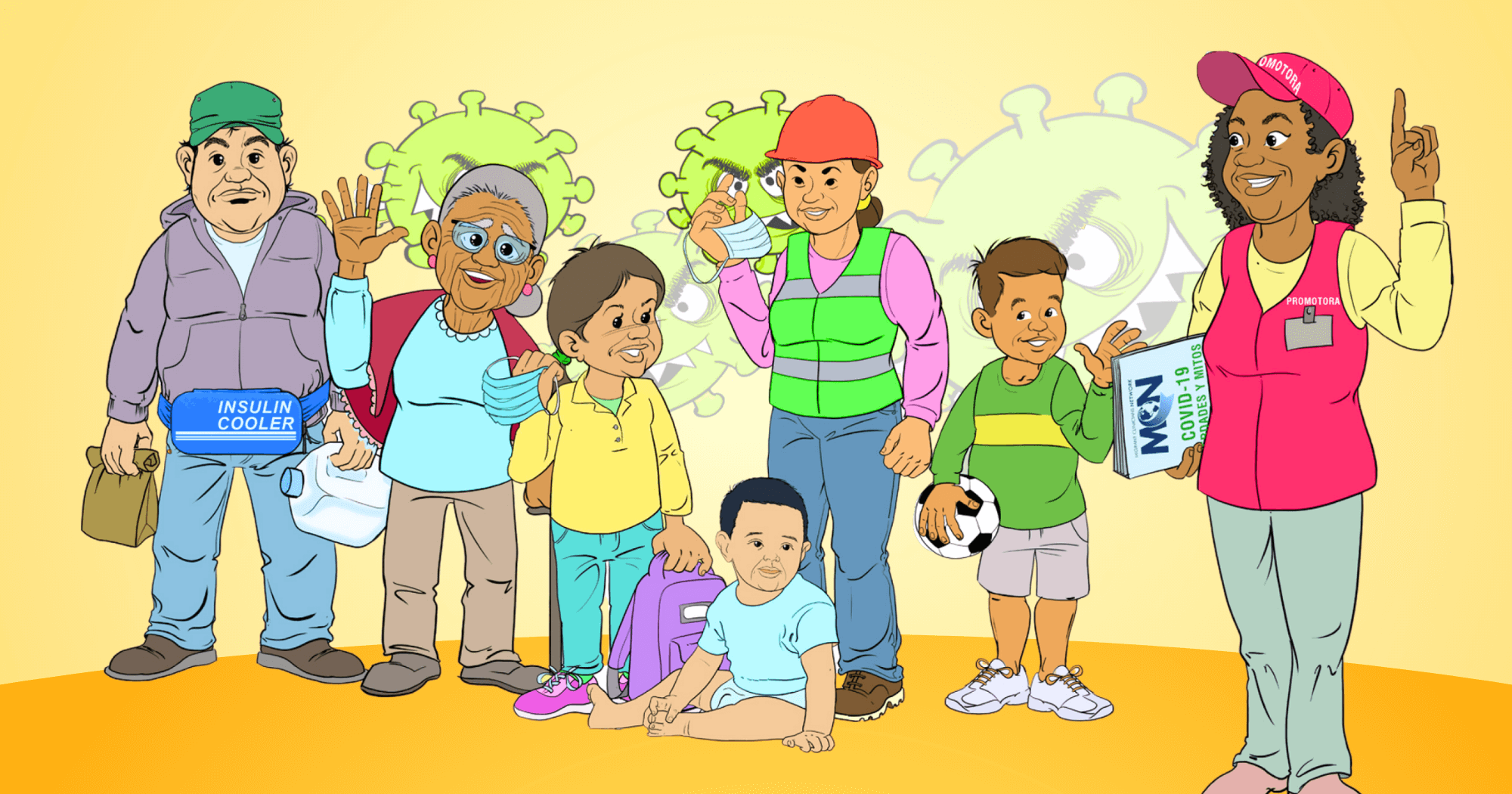
Despite wide availability of information on COVID-19, including evidence-based guidance on how to prevent infection, dissemination of this information to low-literacy Spanish-speaking communities like migrant agricultural workers has been uneven. Consequently, many people still do not understand some of the basic public health strategies that have been successfully employed throughout the pandemic, nor do they have access to newer information about ongoing and evolving COVID-related concerns, like long COVID and changing vaccination schedules.
Migrant agricultural worker communities frequently have poor access to health information as a result of overlapping barriers like language, isolation, and poverty. Health organizations tasked to serve their health needs, like community health centers, frequently lack organizational capacity to implement effective and relevant health strategies for these communities. Some health centers, however, have prioritized health outreach teams comprised of Community Health Workers (CHWs) or promotores de salud. CHW teams are widely recognized as important members of the care team, providing public health messaging and services to communities that have been historically marginalized in public health outreach and health care overall, and making key bridges between these communities and the health center. CHWs have been shown to improve health outcomes when engaged in the care team. Studies demonstrate that the integration of CHWs help clinical teams meet the “triple aim”: improved population health, improved patience experience, and reduction in the cost of care.1 Many CHWs, however, lack access to clinical training, and have limited access to linguistically and culturally appropriate materials that they can use with their specific communities.
In order to guide and support CHW teams in providing evidence-based and up-to-date COVID-19 content, Migrant Clinicians Network (MCN) has developed a new low-literacy, Spanish-language comic-based rotafolio, or flip chart, and an accompanying CHW guide to ensure effective program delivery, with funding from the Thoracic Foundation. Critically, much of the guide provides basic clinical information on the spread of any infectious disease, ensuring that the guide is useful beyond the scope of COVID-19 as well.
“Migrant Clinicians Network believes in the role of the CHW as an extension of the health team,” said Alma Galván, MHC, Director of Community Engagement and Worker Training for MCN. Galván, supported by MCN’s education and communications teams, worked with longtime MCN collaborator Salvador Saenz, illustrator, to build the rotafolio, which consists of 26 pages of full-page color comic images with minimal and simple language. One colorful page illustrates the mRNA vaccines as a trumpet declaring the arrival of the virus, so white blood cells can arrive and defeat the virus, which may prompt the CHW to provide some basics on how the vaccines work. Another page clarifies that the mRNA vaccine does not contain products from blood, fetuses, eggs, or pigs, with images of each, allowing the CHW time to engage with participants on misinformation they may have heard. The final page in the guide includes a seated woman in distress, rubbing her forehead, while images of past-due bills, checks, and news on COVID fill the space around her. Here, the CHW can address the many ways that COVID can affect someone – not just physically, but emotionally and mentally as well.
The rotafolio also addresses long COVID, with one page dedicated to the many ways that COVID can affect the body after its acute phase. “The rotafolio is intended for CHWs to cover the basics of COVID, but also incorporates newer information like about long COVID, boosters, and treatment,” Galván added. “Information might continue to change – but the pictures are long lasting in the sense that they can cover a lot of ground without a lot of text.” CHWs can edit the information they share as understanding of long COVID, for example, changes.
The characters in the rotafolio include the entire family, from toddlers to grandmothers, along with a worker in a hardhat, a protein processor, a person using an oxygen tank, and many others. “It’s colorful, it’s appealing, and it’s for the whole family,” Galván noted.
The accompanying guide helps the CHW lead conversations on the content of the rotafolio, answering basic questions that are applicable to all infectious diseases, like, “What are infectious diseases?”, “What are vaccines?”, and “What is the immune system?”, as well as COVID-specific questions like, “What is COVID-19?”, and “How is COVID transmitted?”, before covering in-depth questions around misinformation, bivalent vaccines, ventilation, and proper respirator use. Motivational interviewing is a key component. “We need to be cognizant of who is in front of us. We need to listen more about what their issues are, what their hesitancies are, and then ask if they want to hear information from us,” Galván said. Providing time for the participant to articulate hesitancies grows trust and ensures that the participant is engaged. If they don’t want to hear the information but the CHW provides it anyway, the division between the participant and the CHW may grow, Galván added. The guide is built to enable CHWs to incorporate motivational interviewing into their approach, be it with an individual or group, to build rapport with the community, specifically to acknowledge their concerns and fears, before introducing new information.
The rotafolio and accompanying guide are now available on the MCN website.
Visit www.migrantclinician.org/es/resource/covid-19-y-nuestra-comunidad-rotafolio.html to download and print.